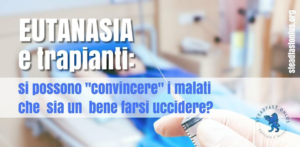SteadfastNGO
21 April 2020
No Comments
ASSISTED SUICIDE CAN NEVER BE AN ALTRUISTIC DEATH
 In 2016 the Supreme Court of Canada’s Carter Decision decriminalised medical assistance in dying (MAID), comparing it to a medical act, thus to the providing of treatments or palliative cares.
In 2016 the Supreme Court of Canada’s Carter Decision decriminalised medical assistance in dying (MAID), comparing it to a medical act, thus to the providing of treatments or palliative cares.
Since then, many Canadian MAID providers operate largely independently, due to the lack of a centrally coordinated response to the requests of some patients for voluntary euthanasia, without any concern about individual repercussions.
Not only, around this practice the interest of other organizations, those involved in organ donation, has developed. Three are the main ones in the province: Trillium Gift of Life Network, Transplant Québec and British Columbia Transplant.
So, the next step didn’t take long to come.
The “altruistic” death has become the new frontier of medical assistance in suicide in Canada. If you ask for MAID, it will be thanks to you, to your “humanitarian” gesture, that other citizens on waiting list for a transplant will be able to receive organs and tissues as well as a hope of new life.
Patients who are dying or with a planned medical assisted death, not necessarily terminal, are then promptly contacted by these organizations to discuss the possibility of donating their organs.
The sweet death, always “sold” as the only decent way and possible at home, surrounded by the loved ones, undergoes a marketing transformation, too.
And since medical assisted death, with the consequent removal of organs, must necessarily take place in a hospital, they get sentimental, leveraging on convincing the requesters their gesture is the maximum demonstration of humanity.
According to guidelines issued by the Canadian Medical Association, organ removal cannot take place before the heart has stopped beating, although two Canadian medical researchers and a Harvard bioethicist have questioned how this limit reduces the quality of donated organs.
They say in the New England Journal of Medicine: “A superior model, they suggest, could be to kill the patient by removing his organs. After all, the best organs come from people who are still alive, such as kidney donors. Death by organ removal would be a more efficient method of organ harvesting for assisted suicide patients.”
For us, as Steadfast Onlus, it’s clear then how it becomes indispensable to sweeten this kind of practice, otherwise unacceptable by public opinion, with the appellative of “sweet”, “good” or “altruistic” death, even if it would probably be more correct to say that it is a “utilitarian” death.
© Copyright 2024 Steadfast | Privacy policy
